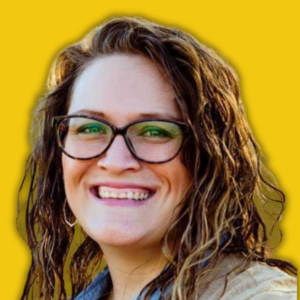 Kelsey Beggs, MBA, CRHCP
Kelsey Beggs, MBA, CRHCP Clinic Administrator
Sudan Medical Clinic
Sudan, Texas
When Kelsey Beggs started as the Clinic Administrator at Sudan Medical Clinic (SMC) in 2021, she was new to Rural Health Clinics but hit the ground running. Her commitment to the Sudan community is evident in her progressive efforts to seek new information and programs to improve the clinic’s services and patient care. Kelsey works tirelessly to ensure this essential clinic in a town of 1,000 continues to thrive.
In the few years since joining SMC, we have renewed our Rural Health Clinic accreditation, earned Patient-Centered Medical Home (PCMH) certifications, joined a new ACO, and taken on many Value-Based Care projects. As a clinic leader, I’ve advocated at the federal level and started working at the state level to get additional PCMH funding. We’ve worked hard to show our communities we are here for the long haul. Through partnerships with the National Association of Rural Health Clinics and other organizations, I ensure the rural voice is heard at events and in conversations with policymakers.
I have been lucky to connect with many local, state and national partners to raise awareness of rural healthcare issues and advocate for policy changes. I find hope and success in highlighting critical issues and presenting solutions our clinic has found that can be used on a broader scale.
Post-COVID, we participated in two vaccine confidence grants, providing vaccine education through social media and community events. These efforts allowed community members to learn more about vaccines, leading to more awareness in the community.
Though I earned my MBA, my interest in health care never faded. My position at SMC brought my knowledge and passion together for a new career. Growing up in a rural town, it was often frustrating that everyone knew each other; however, I knew the community cared. Now that I am older, giving back in a small way to a community that grew and shaped me has been very rewarding.
Sometimes, when people think ‘rural,’ they think of those old Western movies where tumbleweeds roll down dirt roads, but we are so much more than that. Rural people are not afraid of a new problem; they will find a solution or a workaround. Rural people are kind and always ready to lend a helping hand. So, the ‘Power of Rural’ is kindness, preparedness, fearlessness, and resourcefulness, but also so much more that is hard to capture in words.
The Texas State Office of Rural Health has been so beneficial not only to my professional development but also to the growth of the clinic. SMC would not have been as successful or knowledgeable without their assistance.
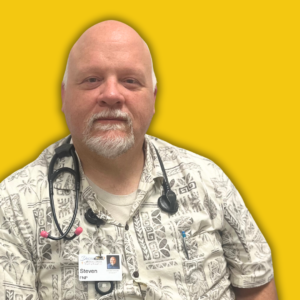 Steven Barlow
Steven BarlowFamily Nurse Practitioner
Dakota Regional Medical Center
Cooperstown, North Dakota
Steven Barlow has served Griggs County residents for over eight years. Whether working in the emergency room clinic or nursing home, his dedication to his practice and patients is evident. Known for going the extra mile, he regularly travels over 40 miles to a satellite clinic and nursing home, stays late, and always offers a helping hand. Steven ensures his patients receive timely, professional care and is always available to answer their questions, even after hours. He even organizes staff activities to ensure his colleagues know how much their efforts are appreciated. Steven is committed to Dakota Regional Medical Center and the advancement of rural health, setting an example for the next generation of healthcare workers.
As part of a small medical team of three full-time nurse practitioners and a medical director, I do a bit of everything. We constantly assess the community’s needs and find ways to respond. Whether discussing bullying at the school or starting a new dialysis program, we always strive to expand how we serve.
It is a blessing to be able to do this every day. I particularly enjoy working with nurse practitioner students and watching their excitement for working in rural health grow.
We are eagerly awaiting the launch of our dialysis program. We also recently started cardiac and pulmonary rehab programs. I love helping people get care close to home.
We’ve been incredibly fortunate to collaborate with our local tertiary care facilities, which are always available and ready to answer questions. Additionally, we utilize a telehealth emergency medicine service. These partnerships help us balance providing safe, high-quality care in our small rural facility and coordinating transfers to more resource-rich settings when necessary. I cannot thank them enough for their professionalism and genuine interest in the well-being of our patients.
To me, health care is about relationships. There is no better place than a small community for me to develop meaningful and therapeutic relationships with those I serve.
Rural folks are, by nature and circumstance, problem solvers. They embody the idea of doing less with more. I am constantly amazed at my colleagues’ willingness and flexibility to find creative solutions to provide high-quality solutions to meet our customers’ needs.
The North Dakota Center for Rural Health staff are phenomenal folks and fully committed to the promotion of rural health.
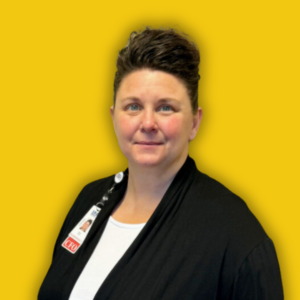 Kena Allen
Kena AllenCFO
McCurtain Memorial Hospital
Idabel, Oklahoma
Kena Allen has served in multiple roles at McCurtain Memorial Hospital, a Critical Access Hospital in the southeast corner of Oklahoma. She has provided steady leadership through numerous transitions. Her deep engagement and unwavering commitment reflect her strong desire to see the facility succeed.
Our mission is to provide necessary health care to all residents in our community, especially those with no other means to access services. We serve an impoverished area where many cannot afford to travel for care, so it’s crucial for our hospital and Rural Health Clinics to be a resource for all. It’s not just about money or the bottom line; it’s about being there for people in their greatest times of need, day in and day out.
In a rural setting, we wear many hats and do whatever it takes to accomplish the mission. It’s about not just saying we care, but showing we care. We do this by engaging with our community by hosting and participating in events.
One of the most rewarding experiences is keeping our doors open despite significant challenges. These obstacles have made our team stronger and more resilient – the best is yet to come.
I am proud to work for an organization that wants to not only provide health care services but to be a resource to other community agencies. We partner with our local Child Welfare Office and provide bags of clothing, hygiene items and even toys to children who have been removed from unimaginable circumstances. Through our Wellness and Rehab Center, our showering and bathing facilities are open 24/7 to them. It is our privilege to try to be a blessing to these children and the Child Welfare staff dealing with these issues.
The “Power of Rural” is about communities coming together for a common purpose, united in their mindset and willing to be a voice for their community’s needs. It’s about building up one another, thinking outside the box and overcoming any sense of feeling too small to make a difference. Together, we can do anything!
Our State Office of Rural Health is exemplary. They are a resource for us that leads to more resources. They continuously share insightful data and information and assist in networking us with other rural Hospitals within our state and region. We have enjoyed many years of working with our State Rural Health Office and look forward to many more.
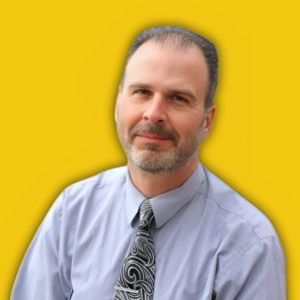 Michael Baker
Michael BakerHealth Services Director
Jefferson County Public Health
Madras, Oregon
Dr. Baker truly embodies the spirit of a Community Star. He tirelessly advocates for equality among Oregon’s rural local public health and healthcare organizations, efforts that significantly contribute to better health outcomes in our rural communities. He has forged strong partnerships, both statewide and within his county, to improve the health of the most underserved. His leadership and steadfast commitment to making a positive difference are awe-inspiring.
My role and the roles of everyone in Jefferson County Public Health (JCPH) are so intertwined it is nearly impossible to separate the work. As the Health Services Director, I collaborate with every program and advocate for staff and the services we provide. JCPH has been involved with everything from homelessness to housing, successful early pregnancies to WIC, supporting new babies with our Infant@Work and Sippy Cuppers programs, and developing policies to help create a healthier community. Locally, there is an ongoing joke that whenever two or more groups gather, JCPH will be there. As a region, social drivers of health are a priority. These are also the programs and approaches to health that public health has prioritized locally for decades. As more partners and organizations enter this work, JCPH is honored to help focus on how this work happens locally.
After 20 years in rural public health, the most rewarding part of my work has always been collaborating with dedicated staff who care deeply about their community. It is absolutely energizing to work with a group of people who want to be there and are committed to doing their best to make life better for everyone. It is impossible to have a bad day at work when everyone is so motivated to make positive change.
I was inspired to pursue a career in rural health because I live in a rural community and can see the barriers and opportunities firsthand. Selfishly, I want to stay in rural, so I work to ensure that there are more opportunities than barriers to living a long and healthy life.
The “Power of Rural” comes from its connections – our health care, schools, businesses, and local governments working directly together every day. These existing relationships make it easier to come together with our daily work, during an emergency, or during times of need.
JCPH is excited to work with the Oregon Office of Rural Health on the Rural Population Health Program, which will help us explore new and innovative ways of addressing health disparities in rural communities.
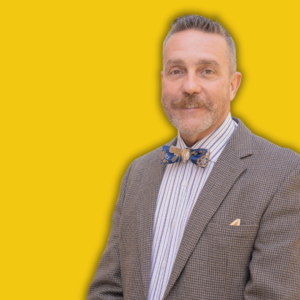 George Garrow, MD
George Garrow, MDChief Executive Officer
Primary Health Network
Sharon, Pennsylvania
Dr. George Garrow is a beacon of dedication and leadership in rural health. His strategic use of resources and innovative approaches have enhanced healthcare accessibility and significantly improved outcomes in underserved areas. Through collaborations with key state and community organizations, Dr. Garrow has been instrumental in developing programs tailored to rural health challenges. His partnership with the Pennsylvania Area Health Education Center to recruit primary care providers and his collaboration with the Penn State College of Medicine to provide training experiences for medical students in rural settings ensures the future of quality health care. His leadership, advocacy, and collaborative spirit have inspired countless individuals to pursue excellence in rural health and have undoubtedly made a lasting difference in the lives of Pennsylvania’s rural residents.
I joined Primary Health Network, a Federally Qualified Health Center, in 2016 as Chief Medical Officer and was proud to help address the healthcare needs of our rural communities. I am incredibly honored to now serve as the CEO. When asked to serve as CEO, I made a commitment to meet with every employee and visit every community served by our Network to get to know them better and listen to their perspectives and concerns.
It is rewarding to see patients and their families out and about in the community. They come up to me to share their experiences in health care, and I’m humbled by their trust.
During the pandemic, we realized that some members of our community were disconnected and unable to access vital care services, including the COVID-19 vaccine. We committed to ensuring that our services were accessible, adaptable, and acceptable throughout the community. I personally made home visits to administer vaccines to homebound individuals who otherwise would not have been able to receive care.
Along with our community’s health foundation, the Buhl Regional Health Foundation, the leaders of our county’s health systems and hospitals convened a County Health Task Force to think creatively about health and health outcomes and to collaborate on ways to address social drivers of health.
I was born and raised in a rural community. My parents instilled in me the importance of service, particularly to neighbors who may not have had access to the same resources we had. They taught me lessons in humility, gratitude and respect for everyone.
We are honored to work closely with the Pennsylvania Office of Rural Health to learn and collaborate as we better understand and address the needs of the communities we are honored to serve.
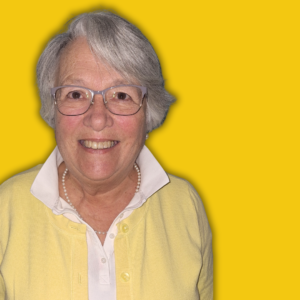 Andréa Martin
Andréa Martin Secretary/Retired educator
Washington County Coalition for Children
Carolina, Rhode Island
As a long-time volunteer with the Washington County Coalition for Children (WCCC), Andrea Martin has been a passionate advocate for the well-being of children in rural Washington County. She leads the children’s book list initiative, carefully reviewing and recommending books on important topics such as bullying prevention, cultural diversity, and children’s mental health for local schools and public libraries. Andrea has also dedicated countless hours to improving children’s mental health across rural Rhode Island, making a lasting impact on the community.
My involvement with WCCC, a regional child advocacy organization in rural Southern Rhode Island, began in 2003 when I was a consultant for the state’s Child Care Support Network and was invited to serve on the Children’s Mental Health Advisory Board. Since then, I’ve overseen various subcommittees and special projects and now contribute as a Board member. WCCC’s 20+ year legacy is built on advocacy, collaboration, and innovation. Our mission is to be a voice for the health and well-being of children and families by creating a culture where all children in Washington County can thrive. We convene multi-sector stakeholders and community members, including youth, to identify needs and engage in collaborative problem-solving to improve outcomes. Even after retiring, I remain dedicated to the Coalition’s mission as a volunteer.
Like most rural areas, our region struggles with limited resources. The affluence in some shoreline areas of our county often means we miss out on state programs and funding, so we’ve had to create and fund our own solutions. As a former special educator, I’m particularly proud of our work on bullying prevention best practices. I strongly believe in the magic of storytelling and books in teaching lessons to children and have enjoyed leading our Feelin’ Groovy emotional literacy art project with local schools and libraries. Partnering with children’s mental health clinicians, educators, librarians, book clubs, university interns, and many others has allowed us to create innovative resources that reflect best practices across disciplines while meeting the needs of our community.
When the state launched its quality rating system for childcare providers (BrightStars), only one provider from Washington County participated. I helped organize local workshops and mentoring sessions to encourage more providers to undergo quality rating assessments and adopt changes to how they care for children. As a result, it’s now the norm for local providers to be involved, improving the quality of childcare in our region.
People and organizations in rural areas thrive because of a sense of independence and tenacity. They don’t wait for solutions to come to them but rather figure out their own solutions. They understand challenges and are eager to help their neighbors. The Power of Rural is People Power!
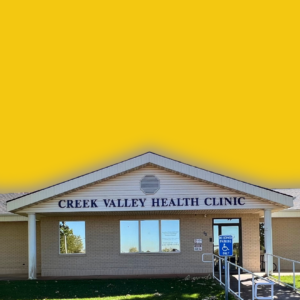 Creek Valley Health Clinic
Creek Valley Health Clinic Serving Hilldale, Utah & Colorado City, Arizona
Creek Valley Health Clinic, a Federally Qualified Health Center, serves the twin cities of Hilldale, Utah, and Colorado City, Arizona. Given the unique background of these cities, they are best thought of as one community rather than two separate cities in different states. The clinic operates in an area with one of the highest poverty rates in the state. Before the clinic opened in 2019, there was no access to local medical and dental services. Beyond providing integrated health services, Creek Valley also supports patients as they navigate referred specialist services, apply for health insurance, and improve their health through community resources.
Creek Valley Health Clinic strives to create a supportive and inclusive environment where everyone can access care, regardless of their ability to pay. Creek Valley engages with the community through outreach, education, and partnerships with local organizations. Its integrated care model includes primary medical care, chronic disease management, mental health services, and dental services, all under one roof. Creek Valley prioritizes health equity and patient-centered care and strives to support patients improve their health and wellness.
A rewarding moment for us was expanding our facility and increasing our capacity to provide integrated medical, behavioral, and dental services. Seeing the new facility coming to life has been incredibly fulfilling. This expanded space will allow us to serve more patients, reduce wait times, and offer an expanded range of services. Witnessing the positive impact on health outcomes thus far reinforces our commitment to providing comprehensive, locally accessible healthcare in our community.
To address limited access to behavioral health, Creek Valley integrates these services into our primary care practice. This involved training staff, establishing communication channels, and utilizing technology for remote consultations and follow-ups. Within the first year of providing integrated care, Creek Valley experienced a significant increase in patients receiving behavioral health services, with improved mental health outcomes, physical health outcomes, patient satisfaction, reduced stigma, and enhanced care coordination. Recently, Creek Valley has integrated dental hygiene services into primary care, focusing on improving oral health outcomes through this evidence-based model.
Creek Valley has conducted numerous school visits, providing health education on a variety of topics. It has also led school-based sports programs, including the creation of an adolescent mountain biking team and supporting a local youth basketball league. These community partnerships impact health “outside of the exam room” and have fostered a healthier, more supportive environment for students and families living in the community.
We’ve been honored to receive the Utah Primary Care Grant for the past five years. This grant, facilitated through our strong partnership with the State Office of Rural Health, has been instrumental in expanding our reach and ensuring access to quality healthcare for all, regardless of their insurance status.
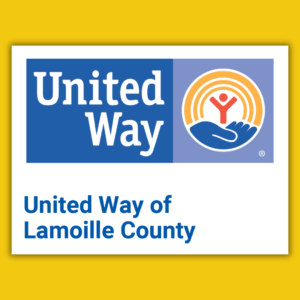 United Way of Lamoille County
United Way of Lamoille County United Way of Lamoille County (UWLC) fosters collective action to address complex challenges in the community by linking partners with resources, mobilizing support, and advocating for equitable access to services. With funding from the CDC, UWLC expanded its capacity to assist rural residents experiencing homelessness and those from historically marginalized or underserved groups. They’ve improved access to technology, enabling community members to connect with essential services like employment, housing, food access, and transportation. UWLC also was a FEMA-endorsed hub for flood recovery efforts across the county in 2023 and 2024, establishing a diverse board to assist those impacted by the flooding. UWLC truly embodies the “Power of Rural.”
At UWLC, our mission is to harness community assets to improve the overall well-being of Lamoille County. We bring together organizations, the faith community, businesses, and residents to leverage their collective talents and ideas. By connecting community partners with the tools they need, we ensure equitable access to high-quality services.
Our care systems are often complex and challenging to navigate, so we created a Mobile Rural Resource Navigator (MRRN) position. The MRRN provides an expert-level understanding of those systems to people trying to navigate them – and in an easily accessible location. In 2023, our MRRN supported more than 880 people in accessing services and support.
At the onset of the pandemic, recognizing that many were struggling to access essential resources, we created a localized resource page to offer a quick and easy list of available resources for our community. Thanks to the support of dedicated volunteers and community organizations, we expanded the page and enhanced outreach efforts. We also launched a weekly newsletter, reaching over 600 recipients, to highlight specific resources and initiatives, including a public health campaign to get residents vaccinated for COVID-19. Following that period, Lamoille County achieved one of the highest vaccination rates in the state.
In 2020, UWLC was invited to participate in a grant project to strengthen local economies. This collaborative effort, involving over 20 local organizations and businesses, addressed equity, housing, transportation, and substance use issues. This collaboration has significantly impacted our community, with key accomplishments including the implementation of Recovery Friendly Workplaces and the creation of the Lamoille Equity Team.
The “Power of Rural” is the connection between community members, the beauty of the landscape, and the ability to address large systemic problems using creativity and ingenuity. Rural communities are an incredible testing ground for solutions to issues that we all face. Relationships are critical to survival and success – when organizations collaborate, they can be hugely successful.
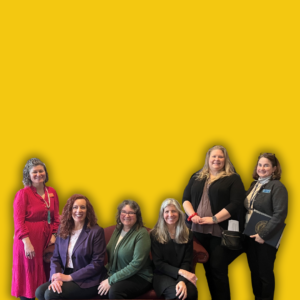 New Hampshire Health Care Workforce Coalition
New Hampshire Health Care Workforce Coalition The New Hampshire Health Care Workforce Coalition, consisting of over 80 healthcare providers, business organizations, and advocacy groups, meets regularly to address key challenges affecting healthcare access across the state. The Coalition has focused on policy solutions that have led to significant investments in New Hampshire’s healthcare system, particularly benefiting rural areas.
The New Hampshire Health Care Workforce Coalition came together in 2018 to address systemic healthcare workforce shortages that led to delays in accessing care. Through our advocacy, we helped secure historic Medicaid rate increases, bringing more than $130 million in additional federal funding to the state. In addition, we successfully secured $6.5 million for the State Loan Repayment Program, greatly enhancing our ability to recruit and retain qualified clinicians in rural areas. We also successfully advocated for expanding the types of providers who can utilize and be reimbursed for telehealth services, which has been essential in expanding access to critical healthcare services in rural areas. Moreover, we helped establish the Health Professions Data Center, which collects healthcare workforce data to identify gaps in provider supply. Ultimately, we believe that better access to quality primary and preventive care improves every life, and we will continue our work in a bipartisan fashion to meet the health needs of the populations we serve.
Community Health Workers (CHW) are a critical component of the integrated healthcare teams serving rural New Hampshire. Our Coalition has been instrumental in supporting CHWs through our advocacy efforts, leading to the creation of a voluntary certification program that allows CHWs to receive Medicaid reimbursement for their work. Listening to them testify about the vital work they do and the impact their work has on the state has been rewarding.
Prior to our Coalition’s formation, healthcare organizations advocated as individuals for change. Our Coalition really brought people together—our motto was “rising tides lift all boats,” and we’ve worked together for six years to effect change. We were successful because we worked together to improve the lives of Granite Staters.
The “Power of Rural” means working together across great geographic distances, with providers across the continuum of care and stakeholders, to ensure people in rural New Hampshire have access to the services they need when they need them.
We partner with our SORH on a regular basis to ensure greater access to healthcare services. We review data, trends, needs, and outcomes to ensure state policies increase access when and where necessary.
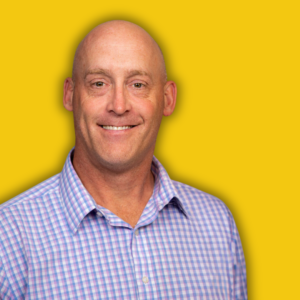 Brock Rops
Brock Rops Executive Director
South Dakota HOSA-Future Health Professionals
Sioux Falls, South Dakota
Brock Rops has been a long-time champion of healthcare career exploration and excellence for young people in South Dakota. As the Executive Director of South Dakota HOSA (Health Occupations Students of America) and Deputy Director of the South Dakota Area Health Education Center (AHEC), he brings unmatched energy to every event. Brock personally impacts all HOSA students, guiding them through the program and into academia and the healthcare workforce as confident, well-prepared professionals. His ability to inspire students supports a healthy and strong South Dakota and drives the “Power of Rural” forward.
As Executive Director of South Dakota HOSA-Future Health Professionals, I help shape the vision and implement resources, programming, and conferences for our student membership. I lead efforts to expand and engage the program with interested school districts across the state. We aim to nurture students in rural and frontier communities who are interested in pursuing healthcare careers. By offering engaging resources, we build their confidence and help “build a better” candidate for our future healthcare pipeline.
After teaching high school for 11 years, helping students succeed remains a passion of mine. The greatest reward is watching students pursue a calling in health care and then witnessing their goals come to fruition. It’s awesome! What really gives me chills is the reflection of their time in the program and the impact it had on their success.
We are currently developing a virtual HOSA program for students in some of the most rural and remote counties in South Dakota. Through technology, we aim to provide resources and opportunities to students with limited options. This virtual option offers online modules and quarterly Zoom calls to keep students engaged and connected.
Over the past three years, South Dakota HOSA chapters have partnered with the American Blood Centers to host blood drives in their communities. So far, five communities have participated, resulting in over 250 donors and hundreds of units of blood donated – a significant impact.
While not on the radar early in my career, it has become a passion of mine to help build confidence in these students, especially in rural communities. My hope is that they better understand the opportunities in their own backyard and have the chance to work and raise a family there.
The “Power of Rural” is a multifaceted engine that embodies economic prowess, altruistic relationships, resilience, and sustainability of all involved. Neighbors, shoulder to shoulder, overcoming any obstacle as a power of “we” and not “me.”